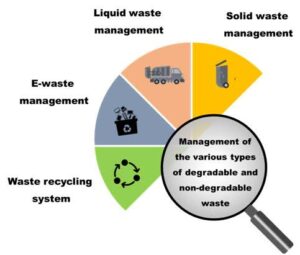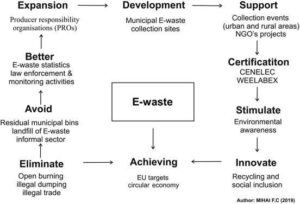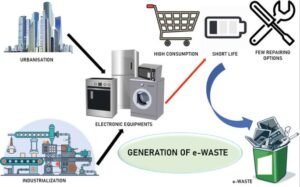Back to: Environmental Biology 200 Level
Welcome to class!
Hello brilliant mind! Have you noticed how quickly our bins fill up with plastics, papers, food waste, and even broken gadgets? If we do not manage this waste properly, our environment becomes dirty, polluted, and harmful to health. Today, we will learn about Solid and Electronic Waste Management, why it is important, and how we can handle waste better.
Solid And Electronic Waste Management
What is Solid Waste?
Solid waste includes everyday rubbish like plastics, food remains, paper, glass, metals, and other materials thrown away from homes, schools, markets, and industries.

What is Electronic Waste (E-Waste)?
Electronic waste refers to old or broken electronic devices like phones, televisions, batteries, computers, fridges, and other gadgets. These often contain harmful chemicals like lead or mercury that can damage the environment if not disposed of correctly.
Sources of Solid and Electronic Waste
Homes: Food remains, plastics, and old electronics.
Markets and Shops: Packaging materials, cartons, and broken electrical items.
Schools and Offices: Old computers, printers, and papers.
Industries: Metal scraps, plastics, and electronic components.
Problems Caused by Poor Waste Management
Environmental Pollution: Plastics and chemicals pollute soil and water.

Health Risks: Dumping waste openly can spread diseases like cholera.
Toxicity: Chemicals from e-waste can poison the soil and harm crops.
Flooding: Blocked drainage systems from waste lead to heavy flooding during rains.
Methods of Managing Solid Waste
Reduce: Avoid using unnecessary packaging and plastics.
Reuse: Use items like bottles, bags, and containers more than once.
Recycle: Convert waste like plastics, papers, or metals into new products.
Proper Disposal: Use waste bins and ensure collection services are effective.
Composting: Convert food waste into natural fertiliser.
Safe Disposal of Electronic Waste
Take old gadgets to certified recycling centres instead of dumping them.

Donate or sell electronics that still work instead of throwing them away.
Support companies that design eco-friendly devices with longer lifespans.
Summary
- Solid waste includes everyday rubbish like plastics, glass, and food remains.
- Electronic waste includes gadgets like old phones, batteries, and computers.
- Poor waste management causes pollution, health problems, and flooding.
- Reducing, reusing, recycling, and proper disposal are key to effective waste management.
Evaluation
- What is solid waste?
- Mention two examples of electronic waste.
- State two problems caused by poor waste management.
- List three methods of managing solid waste.
You’re doing so well! Learning how to manage solid and electronic waste is a big step toward creating a cleaner and healthier Nigeria. Keep shining with Afrilearn — the future of our environment is in capable hands like yours.
